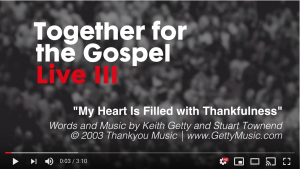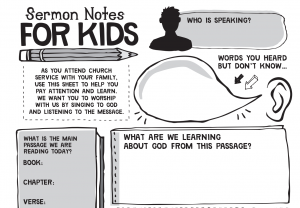Justin Taylor's Blog, page 19
March 24, 2020
Hymn of the Day: Andrew Peterson’s ‘Is He Worthy?’

Do you feel the world is broken? (We do)
Do you feel the shadows deepen? (We do)
But do you know that all the dark won’t stop the light from getting through? (We do)
Do you wish that you could see it all made new? (We do)
Is all creation groaning? (It is)
Is a new creation coming? (It is)
Is the glory of the Lord to be the light within our midst? (It is)
Is it good that we remind ourselves of this? (It is)
Is anyone worthy? Is anyone whole?
Is anyone able to break the seal and open the scroll?
The Lion of Judah who conquered the grave
He is David’s root and the Lamb who died to ransom the slave
Is He worthy? Is He worthy?
Of all blessing and honor and glory
Is He worthy of this?
He is
Does the Father truly love us? (He does)
Does the Spirit move among us? (He does)
And does Jesus, our Messiah hold forever those He loves? (He does)
Does our God intend to dwell again with us? (He does)
Is anyone worthy? Is anyone whole?
Is anyone able to break the seal and open the scroll?
The Lion of Judah who conquered the grave
He is David’s root and the Lamb who died to ransom the slave
From every people and tribe
Every nation and tongue
He has made us a kingdom and priests to God
To reign with the Son
Is He worthy? Is He worthy?
Of all blessing and honor and glory
Is He worthy? Is He worthy?
Is He worthy of this?
He is!
Is He worthy? Is He worthy?
He is!
He is!
“Is He Worthy?” © 2018 Andrew Peterson
March 23, 2020
Hymn of the Day: My Heart Is Filled with Thankfulness

My heart is filled with thankfulness
To Him who bore my pain;
Who plumbed the depths of my disgrace
And gave me life again;
Who crushed my curse of sinfulness
And clothed me in His light
And wrote His law of righteousness
With pow’r upon my heart.
My heart is filled with thankfulness
To Him who walks beside;
Who floods my weaknesses with strength
And causes fears to fly;
Whose ev’ry promise is enough
For ev’ry step I take,
Sustaining me with arms of love
And crowning me with grace.
My heart is filled with thankfulness
To Him who reigns above,
Whose wisdom is my perfect peace,
Whose ev’ry thought is love.
For ev’ry day I have on earth
Is given by the King;
So I will give my life, my all,
To love and follow Him.”
Words and music by Keith Getty and Stuart Townend Copyright © 2003 ThankYou Music
March 19, 2020
Social Distancing Does Not Mean You Have to Stay Indoors

The heavens declare the glory of God,
and the sky above1 proclaims his handiwork.
—Psalm 19:1
In a justly famous lecture to those training for the pastorate, Charles Spurgeon—who suffered from at-times debilitating depression—commended the glory of God in creation as a remedy:
Let a man be naturally as blithe as a bird, he will hardly be able to bear up year after year against such a suicidal process; he will make his study a prison and his books the warders of a gaol, while nature lies outside his window calling him to health and beckoning him to joy.
He who forgets the humming of the bees among the heather, the cooing of the wood-pigeons in the forest, the song of birds in the woods, the rippling of rills among the rushes, and the sighing of the wind among the pines, needs not wonder if his heart forgets to sing and his soul grows heavy.
A day’s breathing of fresh air upon the hills, or a few hours, ramble in the beech woods? umbrageous calm, would sweep the cobwebs out of the brain of scores of our toiling ministers who are now but half alive.
A mouthful of sea air, or a stiff walk in the wind’s face, would not give grace to the soul, but it would yield oxygen to the body, which is next best. . . .
The ferns and the rabbits, the streams and the trouts, the fir trees and the squirrels, the primroses and the violets, the farm-yard, the new-mown hay, and the fragrant hops—these are the best medicine for hypochondriacs, the surest tonics for the declining, the best refreshments for the weary.
This applies not only to a sense of depression and dread and despondency, but also to our battle for purity of mind and heart.
Listen to John Piper:
Do you know why there are no windows on adult book stores? Or do you know why there are no windows on certain kinds of nightclubs in the city?
I suppose your answer would be, “Well, because they don’t want people looking in and getting a free sight.”
That is not the only reason.
You know why? Because they don’t want people looking out at the sky. You know why? The sky is the enemy of lust. I just ask you to think back on your struggles. The sky is a great power against lust. Pure, lovely, wholesome, powerful, large-hearted things cannot abide the soul of a sexual fantasy at the same time.
March 18, 2020
Reading During the Quarantine: New Books and Bibles from Crossway for March

Below is a list of the new and notable resources releasing from Crossway this month. Titles include Enough about Me by Jen Oshman, How Can I Love Church Members with Different Politics? by Jonathan Leeman and Andy Naselli, and the ESV Heirloom Single Column Personal Size Bible.

The Whole Counsel of God: Why and How to Preach the Entire Bible
Expository preaching has been on the rise over the last five decades, with more and more pastors preaching through entire books of the Bible systematically. But few, if any, preachers have a long-term plan to teach every book of the Bible over a lifetime of ministry. Since the whole Bible is God’s word to his people, all of Scripture is important for congregations to hear in order to grow as Christians. Written to make a case for the necessity of a long-term plan for preaching through the entire Bible instead of just randomly through individual books, this is not a book on how to preach, but rather on how to plan and prepare long-range preaching programs through the whole counsel of God.
“Good books on preaching are many. Great ones are few. I regard this one among the great, because it advances novel proposals and covers ground generally overlooked. The authors are well qualified by training, gifting, and longtime practice. They have a burden for congregations not just to know but to love the Bible. They know the key to a congregation that is strong in the word is pastoral preaching that opens up the whole of Scripture, not just cherished bits and themes. Most importantly, they have a plan—calmly articulated but revolutionary in its way—and wise, strategic suggestions to move church leaders toward a more effective grasp and disclosure of the entire Bible’s deep nourishment and challenge. They lay out this plan with skill, tact, and compelling insight.”
—Robert W. Yarbrough, Professor of New Testament, Covenant Theological Seminary”
Enough about Me: Finding Lasting Joy in the Age of Self
Many women live their daily lives disheartened, disillusioned, and disappointed. They feel constant pressure to improve themselves and just never feel like they’re “enough.” That’s because joy doesn’t come from a new self-improvement strategy; it comes from rooting their identity in who God says they are and what he has done on their behalf. This book calls women to look away from themselves in order to find the abundant life God offers them—contrasting the cultural emphasis on personal improvement and empowerment with what the Scriptures say about a life rooted, renewed, and resting in the gospel.
“Lord knows that we have more than enough books about ourselves and never enough books about the God that created us. It isn’t until we see him that we can then make sense of ourselves. I believe Jen Oshman’s book accomplishes that by widening our vision and helping us fall in love with seeing God again.”
—Jackie Hill Perry, poet; author; hip-hop artist.
Why Should I Join a Church?
Many of us have questions about what it means to live as a Christian in the context of a local church. You may even catch yourself asking, If I believe in Jesus, why do I need to join a church? To put it simply, when you are saved from your sin, you are saved into a community characterized by fellowship and accountability. Best-selling author Mark Dever presents seven biblical reasons why church membership is essential for displaying the gospel in your life.
“Christians are pressed by very real questions. How does Scripture structure a church, order worship, organize ministry, and define biblical leadership? Those are just examples of the questions that are answered clearly, carefully, and winsomely in this new series from 9Marks. I am so thankful for this ministry and for its incredibly healthy and hopeful influence in so many faithful churches. I eagerly commend this series.”
—R. Albert Mohler Jr., President, The Southern Baptist Theological Seminary
What If I Don’t Desire to Pray?
If you are a Christian, then you know that prayer is important. Like eating your vegetables, you know it’s good to do—but what about times when you simply don’t want to pray? John Onwuchekwa encourages Christians to talk with their heavenly Father even when it’s hard. This short treatment on prayer will help you understand the basics of why, what, and how to pray as you worship and serve in the local church body.
“Sincere questions deserve thoughtful answers. If you’re not sure where to start in answering these questions, let this series serve as a diving board into the pool. These mini-books are winsomely to-the-point and great to read together with one friend or one hundred friends.”
—Gloria Furman, author, Missional Motherhood and The Pastor’s Wife
What Should I Do Now That I’m a Christian?
When you became a Christian, you recognized your need to be forgiven of sin and freed from sin’s reign over your life. As a result, your life has been changed forever—you are now a follower of Jesus. But what does the Bible say it means to follow Jesus? Sam Emadi offers eight simple steps you should take once you become a Christian, as you set out in newness of life to thrive as a disciple of Jesus.
What If I’m Discouraged in My Evangelism?
One reason Christians don’t share the gospel is because we feel like we’re not good at it. We clam up; we fear what people might think; we feel bad; and the cycle repeats. But what if there was hope for our timid evangelism? Isaac Adams encourages disheartened evangelists to hope in God, not their efforts. If you’ve ever felt discouraged in your evangelism, you’re in good company, and you’re a prime candidate for God’s grace. Come and be reminded of it once more, so that you might joyfully share the gospel again.
How Can I Love Church Members with Different Politics?
Jonathan Leeman and Andy Naselli
Election seasons can cause division on a variety of issues. But what happens when you disagree with someone in your local church community? Authors Jonathan Leeman and Andy Naselli propose that Christians should learn how to disagree on such issues with a spirit of gracious understanding by recognizing the importance of what binds us together as a local church body—the gospel of Jesus Christ.
“As a pastor, I get asked lots of questions. I’m approached by unbelievers seeking to understand the gospel, new believers unsure about next steps, and maturing believers wanting help answering questions from their Christian family, friends, neighbors, or coworkers. It’s in these moments that I wish I had a book to give them that was brief, answered their questions, and pointed them in the right direction for further study. Church Questions is a series that provides just that. Each booklet tackles one question in a biblical, brief, and practical manner. The series may be called Church Questions, but it could be called ‘Church Answers.’ I intend to pick these up by the dozens and give them away regularly. You should too.”
—Juan R. Sanchez, Senior Pastor, High Pointe Baptist Church, Austin, Texas
ESV Heirloom Single Column Personal Size Bible
The ESV Heirloom Single Column Personal Size Bible is a new addition to Crossway’s popular Heirloom collection, combining premium materials with a portable trim size.
At less than one inch thick, this Bible maintains high levels of readability with line matching and generous margin space, and also features a goatskin cover, art gilding, ribbon markers, and high-quality Bible paper—materials designed to last a lifetime.
ESV Literary Study Bible
In order to understand the content of the Bible, readers first need to understand how the content is expressed. The literary forms and features of the Bible are a crucial part of understanding the Bible’s message—both for its original audience and for readers today. Compared to conventional study Bibles that answer the what of a passage, the ESV Literary Study Bible guides readers through the Bible text, showing how to read the passage. Combining over 1,200 insightful notes with the complete ESV Bible text, this volume highlights literary features such as genre, images, plot, setting, stylistic and rhetorical techniques, and artistry so readers can more richly understand the unity, flow, and profound depth of the biblical text. First published in 2007, the ESV Literary Study Bible has been refreshed with an all-new typesetting while retaining all the same content that helps readers discover and teach the message of the Bible embodied in its literary forms and features.
March 17, 2020
Guides for Kids and Middle-Schoolers to Take Notes During the Sermon

For families at home and unable to gather for corporate worship—which is probably all if not most of us by now—the following resources out of the Village Church look like a wonderful way to help elementary and middle-age kids be engaged with the sermon if you listen to it or watch it online.
Sermon Notes for Kids (PDF)
Middle School Sermon Guide (PDF)
HT: Jen Wilkin
March 16, 2020
3 Specific Ways the Church Can Be a Refuge in the Age of Coronavirus

Lyman Stone is a fascinating expert to listen to in this time of upheaval, which is largely unprecedented in our lifetimes. He is the Chief Information Office of Demographic Intelligence, a population consulting firm. And he and his family live in Hong Kong, serving as missionaries in the Lutheran Church-Hong Kong Synod. He is the author of a tip sheet for churches on how to handle infectious diseases.
Here is a recent piece at the ERLC: The Church Must Be a Refuge in the Midst of Fear.
I appreciated this excerpt:
But COVID-19 is a great opportunity for witness. Our communities are full of scared people. Depression, anxiety, and suicide are all likely to spike in the next few weeks. I can guarantee you of this: COVID-19 comes paired with a mental health epidemic. Bereft of community, the outdoors, work, and school, individuals and families will face an unprecedented assault on their minds. The Church must respond. We must make our services physically safe places, adopting a higher standard of hygiene than wider society, so that we can provide a refuge of mind and spirit to scared people.
Since COVID-19 is especially dangerous to elders, churches can seize the opportunity to deliver food and basic supplies to older people in their communities so that they don’t have to go out. This will save lives, minister to the spirits of these dear brothers and sisters, and be a witness to all of their watching neighbors.
Since COVID-19 will lead to school cancellations, Christian families can organize parent-shares for small groups of kids, and use these as opportunities for discipleship in the home, which has proven to have an immensely fruitful effect.
Since COVID-19 will cause many people to be afraid, Christians can, when appropriate, meet friends for dinner or coffee and talk about fear, and the God who casts out all fear. We can explain that we’re just as afraid as everyone else, that we aren’t really very brave people: but Christ died for us. Whom then shall we fear? COVID-19? Hardly.
Since shortages of basic commodities are a guarantee, Christians can set an example of community support. Our churches can pool masks, soap, and other supplies from members, distributing as needed. Our church supplies a week of masks to everyone who shows up on Sunday morning, while many of our church families, including my own family, have more-or-less resolved to share our supplies until there is nothing left. When they have two dollops of hand soap left, Christians give the first one away.
You can read the whole thing here.
March 12, 2020
A Guide for Christian Leaders in the Time of Coronavirus

Andy Crouch has written a remarkable document I encourage all Christian leaders to read.
At this extraordinary moment, local leaders—people who lead groups of 10 to 1,000 people—have perhaps the greatest opportunity to shape culture in the United States that they have ever had. This is a guide for those of us who are Christian leaders at this moment.
Crouch argues that with the arrival of COVID-19 in the United States, we need to rapidly “change the horizons of possibility” in two fundamental ways:
We need to change norms of social interaction literally overnight to minimize the transmission of the virus. I will outline below what I believe are the most important steps, based on the best public information about SARS-CoV-2 (the virus) and COVID-19 (the disease). These steps feel drastic. Crucially, implementing them early enough will require tremendous leadership because they will not initially seem necessary to most of the people we lead. When dealing with pandemics, the measures that will actually make a difference always need to be taken sooner than we think.
We need to redirect social energy from anxiety and panic to love and preparation. This crisis presents an extraordinary opportunity to fortify small communities of love and care for our neighbors. That will only happen if we lead in a way that reduces fear, increases faith, and reorients all of us from self-protection to serving others
For the past month Crouch has been intensively studying the the medical and public-health information about COVID-19 that has been available to the public. His essay has four parts:
What is happening? An overview of the most important things for Christian leaders, anywhere in the United States, to know about SARS-CoV-2 and COVID-19.
What should we communicate? A list of the most helpful messages others can hear from us—and the most harmful messages as well.
What decisions should we make? Recommendations for decisions about large gatherings, medium-size gatherings for Christian worship, and small groups meeting in households.
What can we hope for? A few reflections on the genuine possibility that our decisions in the next few weeks could reshape the practice of Christian faith in our nation and, God being merciful, lead to a revival of the church of Jesus Christ in America.
I’ll try to outline some of his key takeaways below. But I would strongly encourage you to click through and access the entire thing.
1. What Is Happening?
Everyone, anywhere in the continental United States, should assume that the virus is present in their community even if there have not yet been any reports of disease.
COVID-19, the disease caused by the virus, is considerably more deadly than ordinary flu, especially for vulnerable populations: the elderly and those with existing medical conditions.
The disease can be mild in many people, even unnoticed. But this actually increases the risk to others, as “asymptomatic” carriers can transmit the virus to the highly vulnerable without realizing they are infectious.
Therefore there is a serious risk beyond the virus’s simple fatality rate: its potential to overwhelm our health-care system, leading to many more otherwise preventable deaths from COVID-19 and other causes.
Without question we are in for extended financial turmoil and real-world economic pain.
2. What Should We Communicate?
“Just as important for moving the horizons of possibility are what we say, how we say it, and even how we appear to others as we say these things. The way we communicate will shape the choices others make, and how they approach their own decision-making.”
“This means that all of us have a primary responsibility as leaders, as far as it depends on us, to be well-rested, soaked in prayer and contemplation, and free of personal fear and anxiety. We need to start and end each day as children of our heavenly Father, friends of Jesus, and grateful recipients of the Holy Spirit. We need to pray for genuine spiritual authority, rooted in the love that casts out fear, to guard and govern our lives as we lead, and trust that God will make up what is lacking in our own frail hearts, minds, and bodies.”
Out of this basic posture, he says, we can communicate specific messages.
The Most Harmful Messages from Christian Leaders Right Now
We should not say, “Everything’s going to be fine,” or even, “You’re going to be okay.”
We should not say to fearful people, “You’re overreacting.”
The Most Helpful Messages from Christian Leaders Right Now
We should say, “Love is the reason we are changing our behavior.”
We should say, “Prepare for trouble.”
Above all we should say, “Do not be afraid.”
3. What Decisions Do We Need to Make?
“Simply put, anyone, anywhere in the United States, who has responsibility for any group of people needs to change the way those groups gather, immediately and drastically. The steps required would have been unthinkable even a few weeks ago. Now they are essential if we are to protect those vulnerable to COVID-19 and the health system that will need to care for them.”
Crouch offers three recommendations:
Gathering for worship should continue, perhaps after initial cancellations to allow time to put new protocols in place, but ideally in numbers less than 100 and with dramatic precautions that few people in the United States have ever seen.
Other gatherings of more than 100 people scheduled less than four weeks away should be canceled immediately.
Small groups can continue to meet and work together. But we must make significant modifications to the way we interact with one another in our homes and workplaces.
He recommends leaders of church worship services consult this guide: Prepare Your Church for COVID
Some more specifics:
Until it is clear that transmission of the virus has stopped and the curve has bent definitively in the other direction, the right choice is to cancel all public events, especially of more than 100 people, that are not worship of God in Word and Sacrament. Events scheduled for less than four weeks away should be canceled immediately.
My informed judgment is that, provided no one is sick, and no one has reason to believe they have been exposed to SARS-CoV-2 and are within the 14-day window of potential infectious transmission, there is no strong epidemiological reason not to meet together for fellowship, encouragement, shared work, and celebration and recreation—as long as we dramatically change the way we interact with one another.
Groups of less than ten people can meet together with minimal risk, provided that
no one present is sick or has any reason to think they have been exposed to SARS-CoV-2,
shared surfaces are disinfected before and after the meeting
everyone washes their hands thoroughly (more than 20 seconds) upon arrival and upon returning to their home
food and drink are served individually
as much distance as possible is maintained between members of different households and their belongings.
4. What Can We Hope For?
We have every reason to trust that this epidemic will pass.
We can reasonably hope that the economic costs of this epidemic, though severe in the short run, will be limited in the way that past epidemics have been.
“Real Christian hope is our ultimate confidence, rooted in the resurrection of Jesus Christ from the dead, that the Creator of the world is also the Redeemer and Sustainer of the world, and will one day return to renew the entire creation. This hope is not just cosmic but personal, in the astonishing and wonderful words of the Heidelberg Catechism:
What is your only hope in life and death?
That I am not my own,
but belong with body and soul,
both in life and in death,
to my faithful Saviour Jesus Christ.
He has fully paid for all my sins
with his precious blood,
and has set me free
from all the power of the devil.
He also preserves me in such a way
that without the will of my heavenly Father
not a hair can fall from my head;
indeed, all things must work together
for my salvation.
Therefore, by his Holy Spirit
he also assures me
of eternal life
and makes me heartily willing and ready
from now on to live for him.
“One of the great opportunities of this crisis is the chance to relearn these words, teach them to our children and to new Christians for the first time, and live them out together.”
Penultimate hopes that should animate our leadership:
We have an unprecedented chance to act redemptively in the midst of crisis and fear.
We can reclaim the household as the fundamental unit of personhood, the place where we all are best known and cared for.
We may see the revival of genuine Christian faith and discipleship, and the renewal of the church of Jesus Christ in the United States.
I encourage you to read and share the whole thing.
March 5, 2020
An Atheist and a Pastor on Same-Sex Relations and the Image of the Self

In his book The Madness of Crowds: Gender, Race and Identity, Douglas Murray—an atheist who identifies as gay—points to the book The Elusive Embrace: Desire and the Riddle of Identity (1999) by the classicist Daniel Mendelsohn.
While the following description is uncomfortable to read and may not describe sentiments shared by all who engage in gay sex, it is nevertheless a striking insight.
When men have sex with women, they fall into the woman. She is the thing that they desire, or sometimes fear, but in any event she is the end point, the place where they are going. She is the destination.
It is gay men who, during sex, fall through their partners back into themselves, over and over again.
Mendelsohn goes on:
I have had sex with many men. Most of them look a certain way. They are medium in height and tend to prettiness. They will probably have blue eyes. They seem, from the street, or across the room, a bit solemn.
When I hold them, it is like falling through a reflection back into my desire, into the thing that defines me, my self.
This startling admission—confirmed by Murray—brought me back to a sermon by John Piper, where he offers a profound explanation for the sort of thing that Mendelsohn identifies.
Preaching on Romans 1, Piper argues that Paul assumes a “dramatization” of Christ and the Church in Christ-centered heterosexual marriage, and that he also sees a dramatization of idolatry in same-sex sexual behavior, as men and women unite with images of themselves.
The reason Paul focuses on homosexuality in these verses is because it is the most vivid dramatization in life of the profoundest connection between the disordering of heart-worship and the disordering of our sexual lives. I’ll try to say it simply, though it is weighty beyond words.
We learn from Paul in Ephesians 5:31–32 that, from the beginning, manhood and womanhood existed to represent or dramatize God’s relation to his people and then Christ’s relation to his bride, the church.
In this drama, the man represents God or Christ and is to love his wife as Christ loved the church.
The woman represents God’s people or the church.
And sexual union in the covenant of marriage represents pure, undefiled, intense heart-worship.
That is, God means for the beauty of worship to be dramatized in the right ordering of our sexual lives.
But instead, we have exchanged the glory of God for images, especially of ourselves. The beauty of heart-worship has been destroyed. Therefore, in judgment, God decrees that this disordering of our relation to him be dramatized in the disordering of our sexual relations with each other. And since the right ordering of our relationship to God in heart-worship was dramatized by heterosexual union in the covenant of marriage, the disordering of our relationship to God is dramatized by the breakdown of that heterosexual union.
Homosexuality is the most vivid form of that breakdown. God and man in covenant worship are represented by male and female in covenant sexual union. Therefore, when man turns from God to images of himself, God hands us over to what we have chosen and dramatizes it by male and female turning to images of themselves for sexual union, namely their own sex.
Homosexuality is the judgment of God dramatizing the exchange of the glory of God for images of ourselves. (See the parallel uses of “exchange” in verses 25 and 26.)
For more thinking along these lines, see:
Rosaria Butterfield, Are We Living Out Romans 1?
Sam Allberry, The Idol Behind Same-Sex Desires
March 4, 2020
Packer on the Lord’s Prayer as Model Answers to God’s Questions

In Praying the Lord’s Prayer, J. I. Packer says the the Lord’s Prayer offers model answers to a series of questions God puts to us to shape our conversation with him.
What do you take me for, and what am I to you?
Our Father in heaven.
That being so, what is it that you really want most?
[1] The hallowing of your name;
[2] the coming of your kingdom;
[3] to see your will known and done.
So what are you asking for right now, as a means to that end?
[1] Provision,
[2] pardon,
[3] protection.
How can you be so bold and confident in asking for these things?
Because we know you can do it, and when you do it, it will bring you glory!
Pray then like this:
Our Father in heaven,
hallowed be your name.
Your kingdom come,
your will be done,
on earth as it is in heaven.
Give us this day our daily bread,
and forgive us our debts,
as we also have forgiven our debtors.
And lead us not into temptation,
but deliver us from evil.
—Matthew 6:9–13
March 3, 2020
One Rule to Rule Them All : The Real Meaning of Sola Scriptura

Robert Letham, Systematic Theology (Wheaton, IL: Crossway, 2019), p. 234:
[There is a] false notion, held widely, that the slogan sola Scriptura means that the Bible is the only source for theology. . . .
The slogan itself, still less the reality to which it pointed, never meant that the Bible was the only source for theology. The dangers of such a position are most clearly seen in the Socinians, the Jehovah’s Witnesses, and in the early Plymouth Brethren, who, in their first decade, recapitulated many of the heresies of the early church.
When the slogan [sola Scriptura, Scripture alone] was devised, it was never intended to exclude the tradition of the church.
Oliver Crisp, God Incarnate: Explorations in Christology (London: T&T Clark, 2009), 17, discusses the various levels of sources and authority in Christian theology:
[First-Order Authority: Scripture: The Rule that Rules]
1. Scripture is
the norma normans [the norm of norms, the rule that rules—a norming, adjusting, or measuring standard by which other measuring tools are to be measured],
the principium theologiae [fundamental principle/foundation of theology].
It is the final arbiter in matters theological. . . . the first-order authority in all matters of Christian doctrine.
[Second-Order Authority: Ecumenical Creeds: Rules that Are Ruled]
2. Catholic creeds, as defined by an ecumenical council of the Church, constitute a first tier of norma normata [a norm that is normed, a rule that is ruled, a standard or measure that is itself subject to, and defined by, a greater standard] which have second-order authority. . . .
Such norms derive their authority from Scripture to which they bear witness.
[Third-Order Authority: Confessional Statements: Rules that Are Ruled]
3. Confessional and conciliar statements of particular ecclesiastical bodies are a second tier of norma normata, which have third-order in matters touching Christian doctrine.
They also derive their authority from Scripture to the extent that they faithfully reflect the teaching of Scripture.
[Doctrines from Theologians: Legitimate Theological Opinions]
4. The particular doctrines espoused by theologians including those individuals accorded the title Doctor of the Church which are not reiterations of matters that are de fide, or entailed by something de fide, constitute theologoumena, or theological opinions, which are not binding upon the Church, but which may be offered up for legitimate discussion within the Church.
Justin Taylor's Blog
- Justin Taylor's profile
- 44 followers











